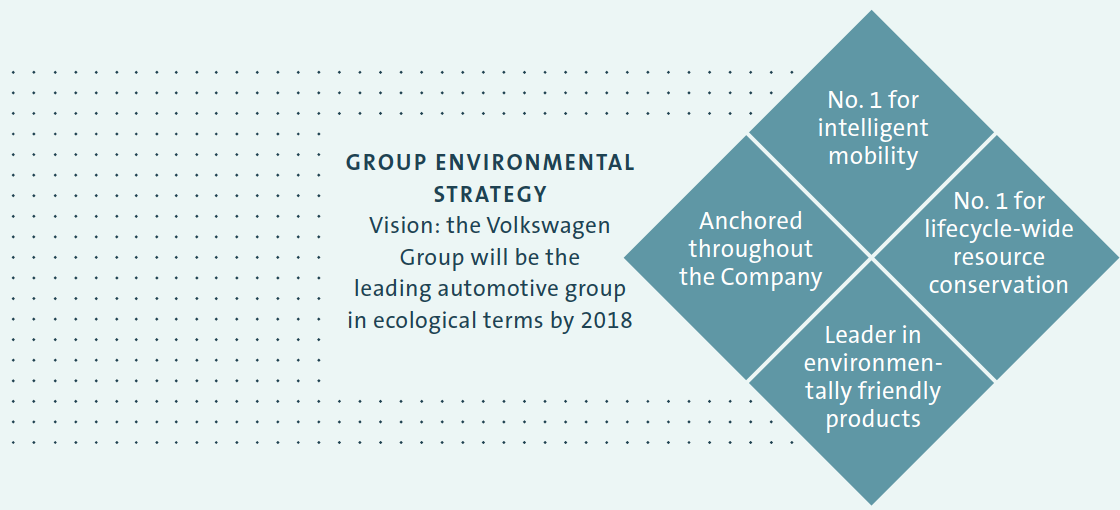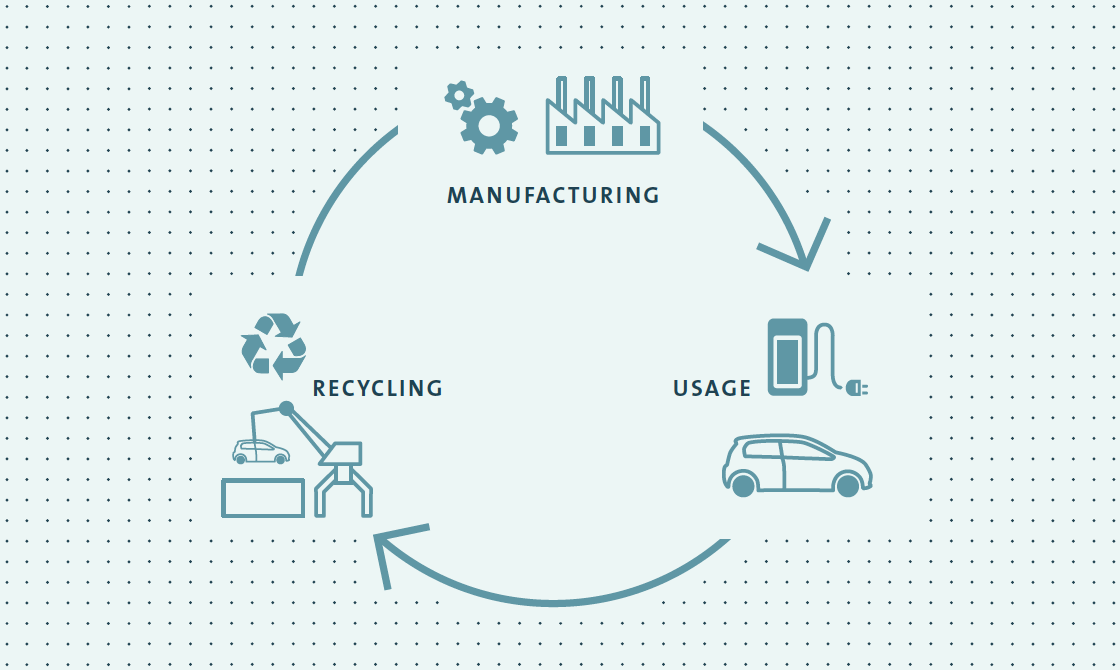On the way to becoming the ecological leader
THE VOLKSWAGEN GROUP’S ENVIRONMENTAL STRATEGY
Stakeholders have increasingly high expectations of companies, particularly with regard to environmental issues. Global megatrends such as climate change, demand for resources, demographic change and increasing urbanization are all contributing to this trend. The Volkswagen Group also faces these challenges, for example in the form of
- political backing for tougher environmental standards (global legislation on CO2 emissions, for example),
- analysts’ research reports and investors’ decisions that are increasingly taking into account companies’ environmental and sustainability performance,
- ever decreasing resources, and
- growing expectations from our business and private customers regarding the environmental features and efficiency of our products.
With its long history of commitment to protecting the environment, the Volkswagen Group is better equipped than most companies to meet these challenges: The first environmental protection department was established as far back as 1971 and environmental management officers at Volkswagen’s European locations have been meeting regularly to discuss topical issues since 1976. Since 1998, the Group has held a succession of conferences on environmental issues with participants from all over the world. As one of the largest automobile manufacturers in the world, we are very aware of our special responsibility and have set ourselves ambitious targets for environmental protection.
GROUP ENVIRONMENTAL STRATEGY

The Group environmental strategy, which was adopted by the Group Board of Management, provides the framework for implementing our vision of also being the automotive industry leader in ecological terms by 2018. Our commitment centers on four key target areas:
- Number one for intelligent mobility
The concept of intelligent mobility brings together people’s desire for mobility and comfort, protection of the environment and reducing traffic inefficiencies. The concept is based on the efficient interplay of people, infrastructure, technologies and means of transport. - Number one for resource conservation across the lifecycle
We take account of our products’ environmental footprint across their entire lifecycle. Our central concern in taking this holistic approach is to protect the environment and in particular to conserve finite resources. The steps we have taken focus on efficient product and process design, the use of innovative environmental technologies and sustainable energy supplies. - A leading manufacturer of environmentally friendly products
Our products combine state-of-the-art technology, comfort and safety, low fuel consumption and lower CO2 emissions with the long-term goal of zero-carbon mobility. - Environmental awareness anchored throughout the Company
The Volkswagen Group’s employees are the driving force behind its environmental strategy. They are well informed, well qualified and operate in an ecologically responsible manner. Our great strength is that, in exchanging best practice, we pool our employees’ knowledge across brands and regions and leverage this across the entire Group.
Through our Group environmental strategy, we make sure that environmental factors are increasingly taken into account in our corporate decision making. An organizational structure comprising six modules – product planning and development, suppliers, logistics, production, sales and marketing and recycling – ensures that all business areas along the value chain are included. The management module entitled “The Company” provides an additional overarching element addressing interconnected issues.
We work together to reduce the environmental impact of our production processes and products. We have set ourselves ambitious targets and identified measures and produced workpackages for every business area. It is extremely important for us to be able to measure the results. We have established Green KPIs (key performance indicators) for every module, and we use them continually to check on progress towards achieving our targets.
THE ENVIRONMENTAL STRATEGY'S HOLISTIC APPROACH

This modular approach along the entire value chain also helps to ensure that we can track a product’s environmental impact throughout its lifecycle, from production through the usage phase, down to recycling. Our holistic approach means that we begin our analysis in the vehicle development phase, and then calculate the environmental footprint for a product’s entire lifecycle. We are thus able to identify where improvements have the greatest effect and develop targeted innovations.
We have established a clear reporting structure, based on existing responsibilities and reporting mechanisms, to ensure effective and efficient management. The Group officer responsible for environment, energy and new business areas reports at regular intervals on the status of the Group environmental strategy and progress towards achieving goals in specific target areas to the Group Board of Management in its role as the Sustainability Board – the ultimate sustainability committee. This officer also chairs the Group’s Environment and Energy steering group, which comprises the individuals with responsibility for these issues in all Group divisions, brands and companies as well as the Group Works Council.
We involve our employees in our environmental strategy by informing them about their targets and about the related procedures. This is a sizable challenge in a company with more than 590,000 employees and over 100 locations. We are increasingly using online platforms to improve information exchange, to network employees with environmental responsibilities and to support training.
Information events and specific training programs are held for management staff, works council members and environment and energy experts at different Group locations. These training programs also encourage participants to exchange experiences and network. The Group’s environment and energy experts also meet regularly at conferences and in working groups. In order to offer training tailored to employees’ specific workflows, training modules are developed for different areas such as logistics, procurement and production.
We provide training not only for our employees, but also for our suppliers. Through our “sustainability in supplier relationships” concept we ensure that Volkswagen’s environmental targets and measures are also taken into account in the supply chain. For example, we provide a digital training module in nine languages on the Group Business Platform, which we make available to all our suppliers.
Our ecological commitment is already recognized worldwide today. The Group’s top scores in prominent sustainability and environmental rankings also bear this out. However, this is no reason for us to sit back on our laurels; rather it spurs us on to defend and strengthen our leading position and implement our vision of becoming the leading automobile manufacturer in ecological terms too.
FURTHER INFORMATION ON THIS TOPIC
www.volkswagenag.com/sustainability